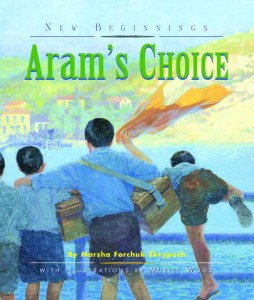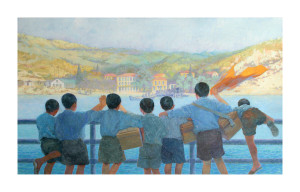From the New Beginnings series, comes Aram’s Choice, a story that follows the life of a boy who loses his family in the Armenian genocide in Turkey and is exiled in Greece. The book follows Aram while he travels to Canada with forty-seven other Armenian boys in what was Canada’s first international humanitarian effort.
Marsha Forchuk Skrypuch first heard about the Armenian Genocide seventeen years ago while doing research for a magazine article about the first “Georgetown Boys” — a group of 47 Armenian orphans who were rescued by Canada in 1923 and were housed and schooled at a farm in Georgetown, Ontario.
After interviewing the son of a “Georgetown Boy,” Marsha was left with more questions than answers. For example, why were all of the rescued orphans male? Why were they all between the ages of eight and twelve? What happened to their parents? What happened to their sisters?
After years of research, Marsha was able to write Aram’s Choice. Based on true events, this book gives children a chance to learn about effects of genocide through one that the Turkish government has long denied ever happened.
Marsha Forchuk Skrypuch is the author of many books for children, including Silver Threads and Enough as well as her YA novels, The Hunger and Nobody’s Child, which was nominated for the Red Maple Award, the Alberta Rocky Mountain Book Award, and the B.C. Stellar Award.
Muriel Wood has been illustrating books for children since 1964, including the Canadian classic, The Olden Days Coat written by Margaret Laurence. Other books that she has illustrated include Old Bird, and the first two titles from the New Beginnings series, Lizzie’s Storm and Scared Sarah.
Excerpt:
Chapter 1
June 10, 1923 — On the island of Corfu, Greece
“Quickly, boys! Form a line,” called Mrs. Walker.
Aram Davidian looked up from his game of marbles. Mrs. Walker was standing in front of the old barracks. The crumbling army building had been converted into a dormitory. He and hundreds of other orphaned boys lived there.
Sarkis, Mikayel, Zaven, Vartan and some of the older boys were playing marbles too. Most of the other children were swimming in the sea, their bodies glistening in the sun.
Mrs. Walker put one hand on her hip, and used the other to shade her eyes from the glare. When Aram saw Mrs. Walker put her whistle to her lips, he stood up. The whistle shrilled. Instantly the boys stopped splashing, and swam to shore. Aram and the rest of the boys ran to the barracks and formed a line.
Aram stood between Mgerdich and Taniel. At twelve, Aram was one of the oldest boys in the group. And he felt luckier than most because he had a grandmother who was still alive. Taniel was lucky too. He had an older sister at the girls’ orphanage. Poor Mgerdich had no family left. Nine-year-old Mgerdich reminded Aram of his own younger brother, who had vanished while they were trying to escape from Turkey.
Mgerdich looked up at Aram with a toothy grin. “Do you think she has a treat for us?” he asked hopefully.
“Maybe,” said Aram. Wouldn’t it be wonderful if Mrs. Walker pulled out a giant bag of sugar-coated almonds, or maybe oranges? Aram’s stomach growled at the idea. The missionaries did a good job of scrounging up food for all their boys, but the menu was limited. Sometimes Aram thought that if he ever saw another bowl of mashed up lima beans he would vomit.
“Attention,” said Mrs. Walker. “There is someone I would like you to meet.”
The door of the barracks opened and their sports teacher, Mr. Chechian, stepped out. Many of the teachers at the orphanage were university professors and scholars who had also escaped from Turkey. These men were anxious to teach the boys as much as possible, and sometimes their lessons were boring. Mr. Chechian was different. He did fun things. He taught them all how to swim like fish, and he took them on long hikes and camping trips.
Following Mr. Chechian was a man the orphans had never seen before.
“Please welcome Mr. Melkonian, children,” said Mrs. Walker. “He is an Armenian shoemaker, and he lives in Canada.”
Aram looked at Mgerdich. “I wonder what he will be teaching us?” he whispered.
Mgerdich shrugged.
“Some of you will be coming to Canada,” said Mr. Melkonian.
Aram could feel his heart go flippedy-flop. He had heard about Canada. It was a country so rich that you could pick gold from the trees!
“…and I want to tell you about it,” continued Mr. Melkonian. He opened his bundle and pulled out a stubby black boot. “Who can tell me what this is?”
Aram put up his hand.
“Yes?”
“It is a soldier’s boot.”
“Close,” said Mr. Melkonian. “This is a Canadian snow boot.”
Many hands went up. Mr. Melkonian pointed to a boy at the far end of the line. “Please, sir,” said Vartan, “what is snow?”
Aram knew what snow was. His family had come from Anatolia, and he remembered the thin blanket of cold whiteness that often covered the ground for months at a time. The children who had come from the warmer areas of Turkey never seen snow. Aram also knew that some of the boys had been born after the escape from Turkey and only knew the milder weather of Greece.
When Mr. Melkonian explained about snow, some of the boys chuckled in disbelief. Then he told them more about Canada. People from all over the world came there to live in peace. There was plenty of food and land and jobs. And no war.
To live in a place without soldiers and war would be grand, thought Aram. Still, he knew he would never leave Corfu. Who would look after his grandmother? Each Sunday his grandmother visited him at the orphanage. He would give her the bits of food that he had scrounged and collected. Sometimes that was all she had to eat. Besides, all his friends were here.
“Fifty of you will be coming back to Canada with me,” said Mr. Melkonian. “Do I have any volunteers?”
“I volunteer,” said Mgerdich, raising his hand.
Aram looked over at his young friend in amazement, and whispered under his breath, “put your hand down.” Mikayel, Zaven, Taniel, Vartan and Sarkis also put up their hands. A few other boys put up their hands too.
But that was not nearly enough.
Reviews
— Okie Booklady wrote:
“The book is about beginning again, but not forgetting, learning to let go, but to treasure what was good and is now good. It’s a beautiful story—both in the text and the illustrations. Not many books that I’m familiar with have dealt with this first atrocity of the twentieth century and certainly there are few for children. Most highly recommended!”
— ALA Book Links wrote:
“Short chapters, appealing full-color artwork, and well researched back matter make this a good choice for readers interested in past humanitarian efforts.”
Helen Norrie wrote:
“What makes this story unique is the inclusion of authentic details provided by a survivor of the ‘Georgetown Boys,’ Kevork Kevorkian. His vivid memories of diving at night around an undersea wreck in Corfu harbour, of a boy falling out the window of their train in Canada, and of the boys collecting all their precious quarters to help their gym teacher make this an intriguing account.”
–Winnipeg Free Press
–School Library Journal wrote:
“This easy chapter book (Grades 2 to 4) tells the story of a group of Armenian refugee boys who made the journey from Corfu, Greece, to Georgetown, Canada, after the Armenian genocide in the early 1900s. The story, based on the experiences of one of these boys, describes a trip of sadness, anxiety, and hope from a child’s point of view. The actual genocide is briefly and gently explained in a historical note at the end. Realistic color illustrations on most pages, some of them spreads, add authenticity to the narrative. Covering an incident little known in the United States, this work would be of particular interest in areas where Armenian immigrants live, but it could also underline a general discussion of humanitarianism.”
Canadian Materials wrote:
“Readers will be intrigued by the delightful descriptions of the boys’ introduction to new experiences in Canada. The hungry children, used to nondescript stews, savour new foods like bananas, spearmint chewing gum and milk and buttered buns.”
Booklist wrote:
“(Grade 3 to 5) Twelve-year-old Aram lives in an orphanage in Greece. His grandmother, who is too poor to keep him, brought him out of Turkey during the Armenian genocide, which claimed the lives of other family members. Along with other boys chosen to emigrate to Canada, Aram travels by cargo ship, ocean liner, and train to his new home, a farm in rural Ontario. Though missing his grandmother, Aram tries to keep the younger boys out of trouble and enjoys many new experiences, such as eating his first banana. Skrypuch based her story on the life of an Armenian orphan brought to Canada in 1923. With at least one small color illustration on nearly every double-page spread, this nicely designed chapter book from the publisher’s New Beginnings series offers a bit of information woven seamlessly into the fiction. A glossary, a historical note, and lists of recommended books, films, and Internet sites round out the book.”
Brantford Expositor wrote:
“This chapter book is replete with engaging and lively characters who bring this little-known slice of history alive for junior readers”


